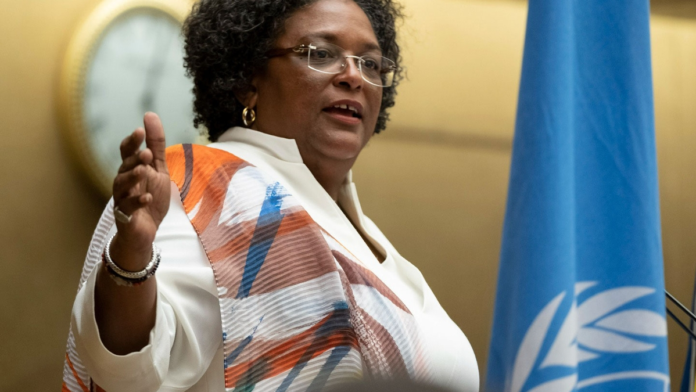With the geographical rotation of the United Nations (UN) Secretary-General position now shifting to the Latin America and Caribbean region, and growing calls for a female leader of the 78-year-old body, Prime Minister Mia Amor Mottley of Barbados is gaining momentum.
Over the past two years, many UN observers, particularly in the international media, have reported that Mottley stands out among the five names viewed as potential successors to António Guterres, whose second term ends in 2026, with the new Secretary-General assuming office in January 2027.
The other prominent candidates being considered include Amina J. Mohammed (Nigeria), Alicia Barcena (Mexico), Maria Fernanda Espinosa (Ecuador), Rebeca Grynspan (Costa Rica), and Michelle Bachelet (Chile). Additionally, reports indicate that former Colombian President and Nobel Peace Prize laureate Juan Manuel Santos may also launch a campaign for the UN’s top role.
Beyond support from progressive groups advocating for the first female leader of the organization tasked with promoting global peace and equity, Mottley has captured the attention of those pushing for “fairer deals” from the global financial powers, including the UN itself.
Her passionate address at the 2021 Glasgow COP26 Climate Conference, where she challenged the inequity of larger countries contributing more to climate disasters, was followed by her launch of the Bridgetown Initiative. This initiative calls for major reforms of multilateral financial institutions, such as the International Monetary Fund (IMF) and the World Bank.
Since then, Mottley has been a powerful advocate at both regional and international forums, urging institutions like the IMF to ramp up their efforts on climate change and development issues. She has pushed for easier financing at lower interest rates, as well as grants instead of loans that stifle small, developing states.
Her successful advocacy for the establishment of a “loss and damage” fund at COP27 in Egypt, a previously unthinkable achievement due to opposition from major powers, and the progress made at COP28 in Dubai, have solidified her reputation as a visionary leader on the global stage.
One potential obstacle to her bid for the Secretary-General role is her stance on UN Security Council reform. During her 2022 General Assembly address, Mottley remarked, “we believe that a Security Council that retains the power of veto in the hands of a few will still lead us to war…and therefore the reform cannot simply be in its composition but also the removal of that veto.”
Her call for the removal of veto power from the five permanent members of the Security Council (United States, United Kingdom, China, Russia, and France) could be a significant gamble. For any candidate to succeed, the Big Five must agree on their candidacy before it is approved by the General Assembly.
The Security Council, tasked with maintaining global peace and security, has the authority to deploy peacekeeping missions, authorize the use of force, impose sanctions, and pass resolutions. Despite notable deadlocks, such as those related to Russia’s invasion of Ukraine and the Israel-Hamas conflict, the Council’s effectiveness remains crucial.
Outside the permanent members, the Council consists of ten non-permanent seats, three of which are allocated to Africa. These seats, which lack veto powers, are elected by region for two-year terms. Brazil and India have long advocated for permanent seats, though opposition remains, particularly from Pakistan and China, as well as Argentina and Mexico in Brazil’s case.
In the months ahead, the lobbying at UN headquarters in Manhattan will intensify as the race to replace Guterres heats up. Simultaneously, pressure will mount for long-overdue reforms within the organization, though rivalries among the 193 member states may continue to stall progress.
According to Article 97 of the UN Charter, the Secretary-General is appointed by the General Assembly on the recommendation of the Security Council. While the length of the term is discretionary, all Secretaries-General since 1971 have served five-year terms. With the exception of Boutros Boutros-Ghali, who was vetoed by the U.S. in 1996, all Secretaries-General since 1961 have been reappointed for a second term.
Historically, Secretaries-General have come from smaller or medium-sized neutral countries, and all have been male career diplomats. No one from Eastern Europe has held the position, and the five permanent Security Council members have avoided nominating their own citizens.
Mottley, the eighth Prime Minister of Barbados and its first female head of government, also serves as Minister of Finance, Economic Affairs, and Investment. A former Attorney General and Member of Parliament since 1994, Mottley has led Barbados in transitioning away from British monarchy and has gained recognition for her advocacy on slavery reparations, climate change, and financial reform.
In a recent UN General Assembly address, she pointedly asked, “How is it possible for Chevron and the European Union to access the oil and gas of Venezuela, but the people of the Caribbean cannot access it at the 35 percent discount offered by the people of Venezuela?”
Her 2022 speech at the Nelson Mandela Annual Lecture in South Africa further emphasized her commitment to global leadership, stating, “working together and making that difference…in what will become not just the battle of our lifetime, but the battle for planet Earth.”








